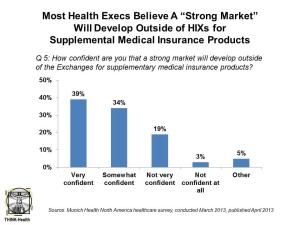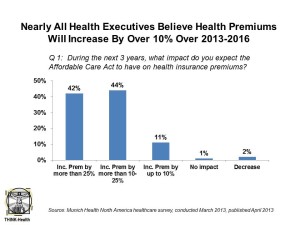As a result of implementing the Affordable Care Act (health reform), most U.S. health executives crystal balls foresee health care insurance premiums will increase over 10% in the next three years. 4 in 10 predict premiums will grow over 25% over the next 3 years.
This sobering forecast comes out of a Munich RE Health survey conducted among 326 health industry executives in March 2013. Those polled included representatives from health plans, managed care, disease management firms, and health insurance brokers and agents.
How do health execs expect employers would deal with such fast-rising health premium costs? Why shift more costs to employees, say 46%. A modest 16% think that employers would “split” the increases with employees, and 8% see the plans change (that is, increase) deductibles but keep premium levels. Only 13% believe that employers would end coverage, sending employees to Health Insurance Exchanges (HIXs) and pay the opt-out penalty. [For employers with over 50 employees that offer health insurance and use tax subsidies for health insurance, the penalty is $3,000 for each employee receiving the tax credit.]
 Other key findings from the survey are that:
Other key findings from the survey are that:
- There’s a roughly 50/50 split regarding whether health plans that the health managers deal with would be operating on the HIX’s in 2014
- 37% of health execs foresee the HIXs will be primary vehicles for individual and small group insurance; another 36% see the HIXs as being nothing more than a high risk insurance pool; and 11% predict that HIXs would shut down in most states.
- 73% of health execs (about 3 in 4) are confident that a strong market for supplemental medical insurance products
- 76% of health executives aren’t confident that the ACA will increase the number of health insurers and health plan options available to individuals and small employers.
- Most health execs predict that the ACA will have a negative impact on employers hiring full time staff, at the same time increasing part-time staff (to avoid opt-out penalties).
In the past year, 82% of health execs have seen employers’ interest in self-funding group health insurance increase.
Health Populi’s Hot Points: There’s a larger context for this survey, and it’s that the proportion of employers sponsoring health insurance for workers has been steadily declining over the past decade. A report from Robert Wood Johnson Foundation (RWJF) published in April 2013 found that the proportion of workers with employer-sponsored insurance (ESI) dropped 10.2 percentage points from 69.7% to 59.5% between 2000 and 2011. Thus the declining status of ESI in America has been eroding well before the implementation of the ACA begins in 2014.
This survey focused on health executives, who are more entrenched in the nuances of the Affordable Care Act than general employers. Most health execs predicted relatively negative impacts on health care insurance costs and employment impacts. At the same time, their feelings about the viability of Health Insurance Exchanges are less than sanguine.
Many recent articles in mass media argue for greater education and “selling” of the ACA to American health consumers. Kaiser Health News rounds up several stories on this topic, discussing the U.S. Health and Human Service’s engaging a PR/marketing firm to help continue to sell the merits of health reform.
In addition, many publications representing laissez-faire economics and right-wing think tanks have issued warnings about Obamacare, such as The Reason. And there’s a fast-selling book out on surviving Obamacare, of which Publishers Weekly wrote, “Boldly one-sided in this presidential election year, this book lobs stink bombs from the start at president Obama and the Democratic Party….in undermining his credibility with his blatant animus, he will feed political arguments rather than intelligent discussions.”
The co-founder of Home Depot is featured on a video where he talks about Obamacare “killing jobs.”
Huffington Post has a feature talking about 7 companies that are “freaking out” about Obamacare.
It appears there’s another selling job necessary for the White House to implement — directed at the health industry.





 Thanks to Feedspot for naming this blog, Health Populi, as a
Thanks to Feedspot for naming this blog, Health Populi, as a